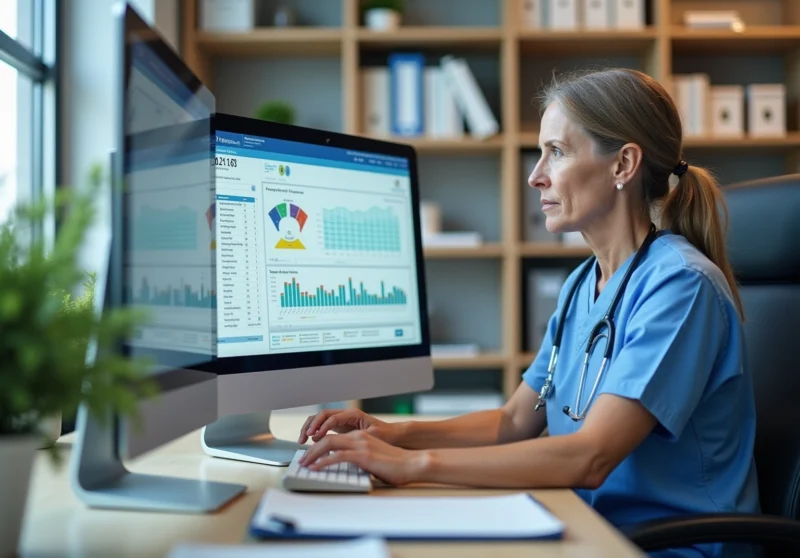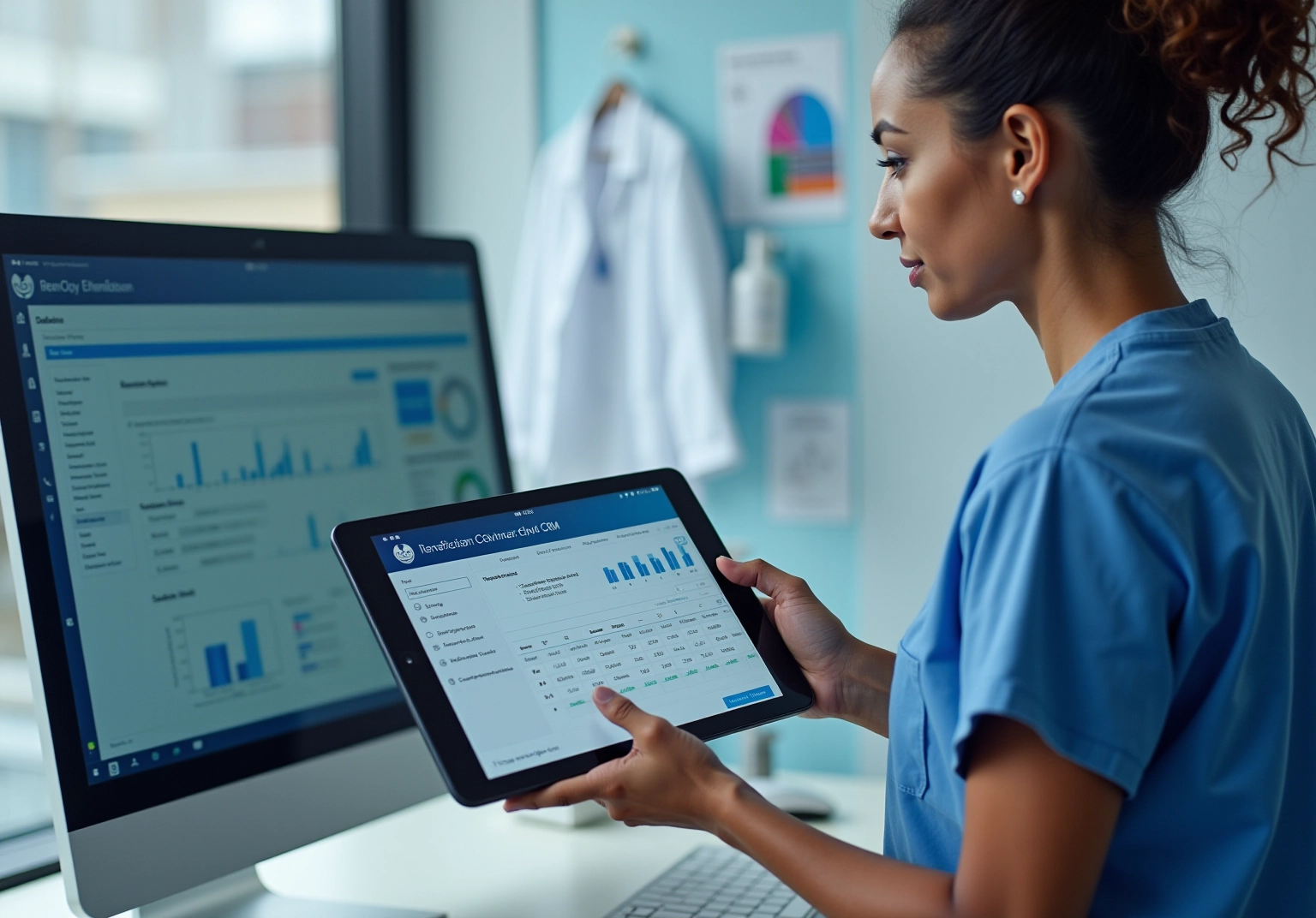
The term “CRM meaning medical” refers to customer relationship management systems specifically designed for the healthcare sector. These systems focus on enhancing interactions between medical providers and patients through effective data management and communication strategies.
By improving patient engagement, streamlining operations, and ensuring compliance with regulations, these systems ultimately lead to better health outcomes and increased patient loyalty.
In today’s competitive healthcare landscape, implementing a robust CRM system is essential for providers aiming to foster stronger relationships with their patients and enhance service delivery.
The healthcare landscape is undergoing a rapid evolution, with technology integration playing a pivotal role in enhancing patient care and operational efficiency. Central to this transformation is Customer Relationship Management (CRM), a crucial tool for managing interactions between healthcare providers and patients. This article explores the significance of CRM in the medical field, examining its benefits, key features, and the challenges it addresses in fostering better patient relationships.
As healthcare organizations increasingly adopt CRM systems, one must consider:
The concept of CRM meaning medical in the healthcare sector addresses the critical need for effective strategies in managing interactions between medical providers and clients. These frameworks consolidate individual information, optimize communication, and enhance engagement throughout the care continuum. Effective medical database management systems are pivotal in this process, facilitating seamless exchanges of information across various touchpoints, including local doctors, specialists, and pharmacies. By leveraging advanced data solutions, healthcare organizations can significantly reduce errors in record keeping, optimize operational efficiency, and ensure compliance with regulatory standards.
Moreover, the integration of Natural Language Processing (NLP) tools can unify healthcare data, thereby enhancing risk adjustment workflows and improving the accuracy of Hierarchical Condition Category (HCC) coding. This comprehensive approach not only fosters stronger relationships with patients but also results in better health outcomes and increased patient loyalty. Furthermore, enhanced data management can yield substantial financial advantages, such as decreased administrative expenses and improved billing precision—both of which are crucial for the sustainability of medical organizations. For instance, organizations that implement efficient database management strategies can streamline their billing processes, leading to quicker reimbursements and reduced operational costs.
Ultimately, the importance of adhering to regulatory standards cannot be overstated, as it ensures that medical organizations maintain high-quality care while effectively navigating complex regulations.

The development of CRM meaning medical in the medical field started in the late 1980s when companies began to adopt CRM tools primarily to manage customer interactions, focusing on sales and marketing. Recognizing the necessity for enhanced client engagement and effective data management, the medical sector witnessed the evolution of systems, particularly those reflecting crm meaning medical. By the early 2000s, healthcare-specific CRMs emerged, which exemplify crm meaning medical by featuring capabilities tailored to the unique challenges of the industry, such as compliance with HIPAA regulations and the need for personalized communication with patients. Today, modern CRMs in healthcare, often referred to by the crm meaning medical, leverage advanced technologies like artificial intelligence and data analytics, offering comprehensive solutions that significantly improve patient care and operational efficiency.
Efficient medical database management frameworks are crucial in this transformation, enabling seamless information exchange across various care touchpoints, including local physicians, specialists, and pharmacies. This integration not only reduces errors in record-keeping but also supports accurate Hierarchical Condition Category (HCC) coding, essential for optimizing Medicare reimbursements. The market for CRM meaning medical is anticipated to grow at a compound annual growth rate (CAGR) of 14.1% from 2024 to 2030, underscoring the increasing reliance on these platforms to enhance client relationships and streamline operations.
The term crm meaning medical refers to solutions that are essential for efficient client data management, featuring centralized client information, communication tools, appointment scheduling, and robust analytics capabilities. By integrating medical histories, preferences, and treatment strategies, these systems empower providers to deliver personalized care. Communication tools enhance individual engagement through automated reminders and follow-ups, ensuring that clients remain informed and connected. Furthermore, analytics capabilities allow healthcare organizations to monitor outcomes and client satisfaction, providing insights that drive continuous improvement. For instance, automatic reporting can facilitate tracking vaccinations or identifying service gaps, ensuring timely interventions. The inclusion of these features not only streamlines workflows but also alleviates administrative burdens, ultimately fostering an environment where care can thrive.
Statistics indicate that the global healthcare CRM market reached USD 17.10 billion in 2024 and is projected to expand to USD 43.40 billion by 2034, reflecting a compound annual growth rate (CAGR) of 9.76% from 2025 to 2034. Numerous success stories exist, with organizations leveraging CRM platforms to enhance communication and minimize errors, thereby improving experiences and outcomes for clients. As one unnamed source aptly stated, ‘Enhancing client experience is not an extra. It is the work.’ This underscores the necessity of prioritizing client information management within CRM platforms to grasp the crm meaning medical, enabling medical practitioners to deliver high-quality, compassionate support. Inferscience’s commitment to data security, demonstrated by their SOC2 Type II certification, further solidifies the trust and compliance essential for CFOs contemplating such investments.

CRM platforms are essential for enhancing client care, as they enable tailored communication, streamline appointment management, and improve care coordination, highlighting the CRM meaning medical. Healthcare professionals can leverage CRM meaning medical tools to send customized health reminders, which significantly boosts adherence to treatment plans and follow-up appointments. Notably, clinics that utilize tools with CRM meaning medical have reported a remarkable 30% increase in client engagement due to these personalized communication strategies. Furthermore, the CRM meaning medical platforms enhance coordination by offering a comprehensive overview of individual information, facilitating seamless collaboration among departments.
This integrated approach not only elevates client satisfaction but also leads to improved health outcomes, which can be understood through CRM meaning medical. Case studies demonstrate a reduction in no-show rates by up to 50% and an increase in participant involvement in their treatment plans. Additionally, efficient database management systems minimize errors in record keeping and provide data-driven insights that aid in prescriptions and diagnoses. By harnessing the power of CRM meaning medical alongside robust database management, healthcare organizations can create a more responsive and effective care environment, ultimately enhancing both patient care and administrative efficiency.
The integration of CRM systems in healthcare signifies a transformative shift towards the effective management of patient relationships and clinical data. By grasping the significance of CRM in medical contexts, healthcare providers can enhance communication, streamline operations, and ultimately improve patient care. This strategic approach not only optimizes interactions but also cultivates a culture of patient-centered care, essential for achieving superior health outcomes.
Key insights throughout this discussion highlight the historical evolution of CRM systems from sales-focused tools to comprehensive healthcare solutions tailored to meet industry-specific challenges. The emphasis on features such as:
collectively empowers healthcare organizations to deliver personalized care and drive operational efficiency. Furthermore, the statistical growth projections for the healthcare CRM market underscore the increasing reliance on these systems to enhance patient engagement and satisfaction.
In light of these findings, it is imperative for healthcare organizations to prioritize the implementation of effective CRM strategies. By investing in these technologies, medical providers can streamline their operations and significantly enhance the patient experience. Embracing the full potential of CRM systems will lead to improved care coordination, reduced administrative burdens, and ultimately, a healthier population. The future of healthcare resides in the ability to forge meaningful connections with patients, and CRM serves as a vital tool in that endeavor.